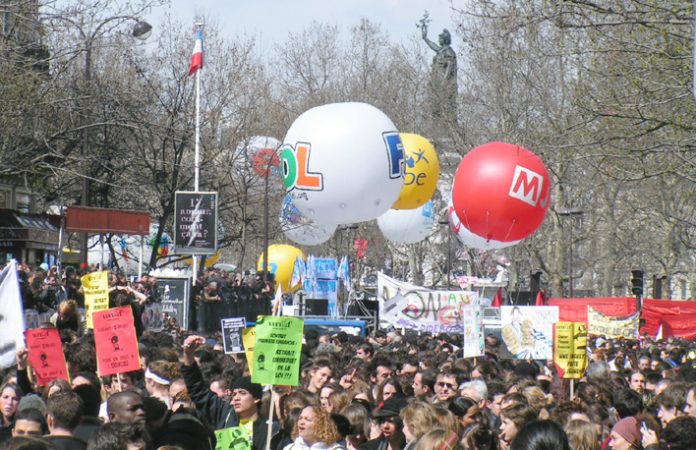Forty-six Renault workers from the sackings-hit Sandouville plant were before a court in Le Havre last Thursday, October 30.
They were taken to court by the management of the company following events which took place on October 13-14 during an anti-sackings and short-time protest blockade of the factory.
The advocate for the company called for measures to be imposed which would stop future blockades and, if blockades went ahead, for fines of 1,000 euros per hour of delay per worker concerned if access to the factory was prevented.
A hundred workers were outside the court in support of the 46.
On Friday, the judge turned down the management’s case on the grounds that as at present no blockage was occurring the suit was invalid.
Meanwhile, three giant French steel plants are to have their output slashed following a slump in orders from the automobile industry, ArcelorMittal, the world number one steel-maker and owner of the plants, has announced.
The three plants are at Dunkerque (Nord), Florange (Moselle) and Fos-sur-Mer (Bouche-du- Rhone).
Furnaces will be shut down and forced leave is expected to be imposed in November, December and January.
Furnace No3 at Dunkerque (5,000 workers) will shut from now until the end of the year.
Unions say that one of the two furnaces at Fos-sur-Mer (3,400 workers) will shut down until January 31 2009.
At the Florange steelworks 3,300 workers will be affected by the shut-down of one of its two furnaces from December 2nd/3rd until January 6th.
Bernard Thibault, CGT secretary-general, condemned employers who he said were using the banking crisis as an excuse to justify a wave of redundancies and factory closures.
The crisis has also hit farmers.
Farmers who produce milk which is transformed into yoghurts, desserts, butter and powdered milk etc have been protesting at the low price that they get for their product.
For the past week they have been blockading selected production centres and supermarkets in advance of talks with the industry’s owners from whom they hope to get a better price per litre.
In supermarkets tactics included entering en-mass and clearing the shelves of the products that their milk had produced, and cordoning off the aisles concerned, plus picketing and leafleting the customers inside the store.
At Air France, a national strike has been called by unions representing air staff for Tuesday, November 4th until Saturday, November 8th.
Eight unions led by the Air France pilots’ union, ALTER, made the call to protest against a discussion in the National Assembly on parts of the draft law for the 2009 social security budget.
The law includes amendments proposing to raise pilots’ maximum retirement age from 60 to 65, and those of air hostesses and stewards, presently fixed at 55 years of age.
The deputies of the National Assembly voted in favour during the night of Friday/Saturday, October 31/November 1st.
The changes are to take place from January 1st 2010.
In addition, the national airline pilots’ union, SNPL, has called for a national strike against the same measure by pilots in all the airline companies in France, to take place from November 14-17.
A shutdown of the national newspaper distribution system took place on Thursday, October 30.
Members of the union federation CGT-(books and written communications) were striking against plans to restructure the industry which would see distribution centres moved and 350 out of 3,000 jobs lost.
The employers are seeking to weaken the CGT in the Paris-centred distribution and printing sectors.
With government support they are setting out to break up traditional practices in order to lower costs and drive up profits by expanding production Wapping-style.
On the docks, the CGT, the main union in the seven autonomous ports, has reached a frame-work agreement with the employers which will see workers in cargo-handling transferred to private companies.
Despite a month of strikes and blockades earlier in the year against the privatisation of the publicly-owned ports, and continuing bitter opposition by the dockers, the secretaries of the CGT-ports announced that they had agreed to the framework agreement.
Negotiations on the framework agreement were imposed on the unions as part of the privatisation law on the ports which was passed on July 4th 2008.
The CGT says that important ‘guarantees’ have been won on the dockers’ future status as employees of the private dock companies.
Meanwhile, the French national rail company will be hit with a train drivers’ strike on Thursday, November 6th.
The strike is called by the CGT and SUD unions over a disagreement with management over working times in the freight section.
A SUD statement said that the company was desperately trying to find ‘volunteers’ to drive Thursday’s trains.
CGT-Cheminots said that the management and the government were getting ready, using the introduction of competition in rail freight as a cover, to start an unprecedented attack on the conditions of SNCF drivers.
The strike will start at 10pm on November 5th and end at 8am November 7th.
